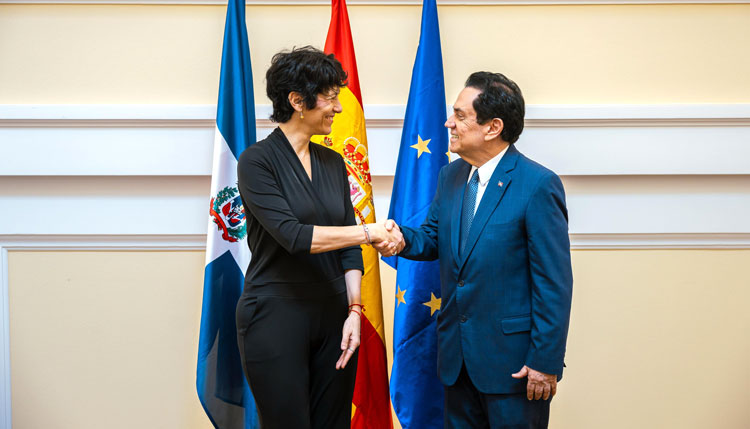The Diplomat
The Ambassador of the Dominican Republic, Tony Raful, and the Minister of Inclusion, Social Security and Migration, Elma Saiz Delgado, held a working meeting last Monday in which the main issues of the bilateral agenda on labour migration were addressed, Social inclusion and technical cooperation.
During the meeting, both parties agreed to highlight the excellent bilateral relationship, supported by more than twenty existing treaties, as well as the solid Spanish presence in the Dominican Republic, with investments in tourism, banking and infrastructure, and consolidated cultural and consular cooperation.
In the area of migration, Minister Elma Saiz proposed that the Dominican Republic be part of the first circular labour migration pilot project developed under the Global Skill Partnerships model, an innovative mechanism promoted by the World Bank that links skills training at source with job opportunities at destination. This approach seeks to ensure orderly mobility and shared benefits, avoiding the loss of human capital in the countries of origin and responding to the needs of the Spanish labour market.
Along with this proposal, it was agreed to convene an exploratory technical meeting to define pilot projects adapted to the Dominican reality, establish a joint roadmap that articulates the 2021 Circular Letter of Intent on Labour Migration and the 2022 Memorandum of Understanding on Inclusion, Social Security and Migration, as well as permanent focal points in the Ministry and at the Embassy to ensure continuity and follow-up of initiatives.
On the social level, the contribution of the Dominican community in Spain was valued, which at the end of 2024 reached 201,162 people, consolidating itself as the second most numerous abroad. Its role in social cohesion, remittances and the strengthening of historical ties reaffirm its importance within Dominican foreign policy.
Synergies were also explored with the pilot projects of the Spanish Ministry linked to the Minimum Living Income, proposing progress in knowledge transfer, technical training, design of inclusion pathways in Dominican municipalities and the establishment of common indicators to measure outcomes in inclusion, employment and social cohesion. It was also agreed to establish a bilateral best practice mechanism, consisting of a permanent technical forum and professional exchange programmes.
Spanish cooperation in the Dominican Republic was recognized as a fundamental pillar of the relationship, particularly for its impact on key sectors such as education, water and rural development.
Finally, the two sides reaffirmed their willingness to strengthen coordination channels and jointly prepare participation in the next Ibero-American Summit, where migration challenges will be addressed through co-responsibility and mutual recognition of qualifications.
The meeting was also attended by Blanca Breñosa Sáez de Ibarra, Deputy Director of International Relations at the Ministry of Inclusion; Macarena Álvarez, Cabinet Director; Minister Counselor Esmeldy Belliard, Deputy Chief of Mission, and Second Secretary Francisco Solimán, as part of the Dominican delegation.
